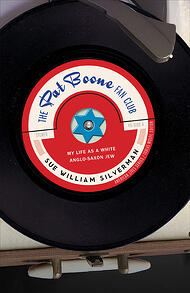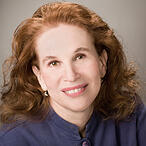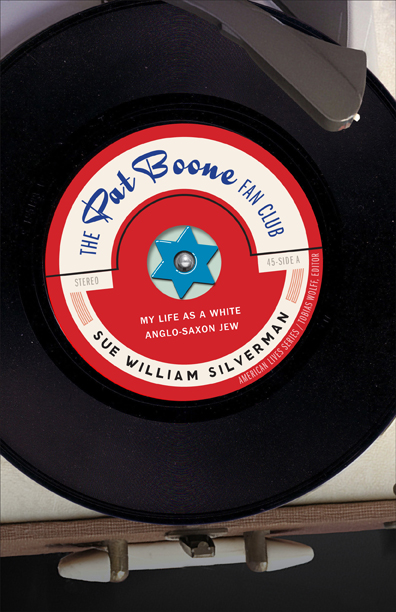by Sue William Silverman
 Secret #1: I’m an incest survivor.
Secret #1: I’m an incest survivor.
Secret #2: I struggled with a sexual addiction.
Secret #3: I’m a Pat Boone groupie!
These are the secrets I’ve confessed, one in each of three memoirs. And, having done so, I now feel lighter in the world – relieved – more authentic.
But it wasn’t always this way.
Before I wrote my first memoir, about growing up in an incestuous family, I was terrified for anyone to learn that secret. I was ashamed. How could I possibly commit to paper that my childhood was a wreck, that I grew up feeling lost and confused. Besides, who would even want to read about me? I’m a nobody. My life is worthless.
Those were the messages I once told myself.
Nevertheless, I was a writer. So I sat in a little room writing, writing, writing: thousands of words on thousands of pieces of paper.
Then, finally, after ten years, I was ready to write my first memoir, Because I Remember Terror, Father, I Remember You. I sent it out in the world. It won a literary award and was published. This book changed my life. Even though that was back in 1997, I still, today, receive e-mails and letters from other women (and men) who thank me for this book, who thank me for telling their story, too.
After this book I wrote another, this one about sexual addiction, with which I’d struggled, a result of childhood incest. Again, I worried: what will people think? This time I felt my fears were more justified. After all, in the first memoir, I conveyed how my father hurt me. Now, in Love Sick, I was an adult having serial affairs and committing adultery. Even more shame.
I have to admit that the reaction to this book was tougher. On a series of radio interviews, I was asked very rude questions, mainly by shock jocks – oh, such things as “where’s the kinkiest place you’ve ever had sex.” On live radio!
For a while, I regretted writing the book. I was humiliated. However, e-mails from “real” readers soon started to arrive. One by one, women whispered their stories to me. They told me “Until I read your book, I never knew I, too, struggled with this addiction.”
Ultimately, the support I received from readers meant much more to me than the imbecility of radio shock jocks! Once again I knew I’d done the right thing to put my shame and fear aside and write the book.
Which brings me to my new memoir, The Pat Boone Fan Club: My Life as a White Anglo-Saxon Jew. This book, much more ironic than the others, still caused an emotional challenge. I write about how, although Jewish, I wanted the 1960s pop-music icon, the overtly Christian and wholesome, squeaky-clean family man, Pat Boone, to be my father. I wanted him to adopt me. Pat Boone was an antidote for my own Jewish father who hurt me.
In short, I wanted to pass as Christian. Beyond my father, I also wanted to flee my Russian Jewish heritage and fit into the WASPy suburb in which I lived. I wanted to look like one of Pat Boone’s four daughters – resemble all my Christian high-school friends. I wanted to fit in, to belong.
Why was revealing this secret scary? I worried about how my fellow Jews might react. Would they understand and accept my struggle? Or would they think I was a traitor to my culture and my religion?
While it’s difficult to answer that question, ultimately, what I’ve come to learn over all these years of writing memoir is that it’s much better to tell secrets than not. Our job as writers of memoir isn’t to make people comfortable. Our job is to write our truths, to turn our lives into art.
Was the writing painful? At times, yes. Did the writing force me to explore in great detail previously held secrets? Yes. Was it worth it? Yes! Writing these three memoirs is the best gift I ever gave myself.
I also came to learn that writing about painful subjects ultimately lessens the pain. With every word I wrote, I felt more courageous. With every word, I also better understood my past, all those secrets.
Writing a memoir helps to organize my life, giving it a previously undiscovered structure. Fearlessly writing memoir allows us to understand our own life narratives.
So, fellow writers, let me offer an exercise in case you’re stuck and need help to get started: Write a short paragraph about a secret you’ve never told anyone, except maybe a therapist. Try to discover why this secret has such power.
Afterward, I hope you feel how I did from writing: lighter, more emotionally free.
###
 Sue William Silverman’s new memoir is The Pat Boone Fan Club: My Life as a White Anglo-Saxon Jew. Her two other memoirs are Love Sick: One Woman’s Journey through Sexual Addiction, which is also a Lifetime TV movie, and Because I Remember Terror, Father, I Remember You, which won the Association of Writers and Writing Programs award in creative nonfiction. Her craft book is Fearless Confessions: A Writer’s Guide to Memoir. As a professional speaker, Sue has appeared on The View, Anderson Cooper 360, and more. She teaches in the MFA in Writing Program at Vermont College of Fine Arts.
Sue William Silverman’s new memoir is The Pat Boone Fan Club: My Life as a White Anglo-Saxon Jew. Her two other memoirs are Love Sick: One Woman’s Journey through Sexual Addiction, which is also a Lifetime TV movie, and Because I Remember Terror, Father, I Remember You, which won the Association of Writers and Writing Programs award in creative nonfiction. Her craft book is Fearless Confessions: A Writer’s Guide to Memoir. As a professional speaker, Sue has appeared on The View, Anderson Cooper 360, and more. She teaches in the MFA in Writing Program at Vermont College of Fine Arts.


Leave Comment